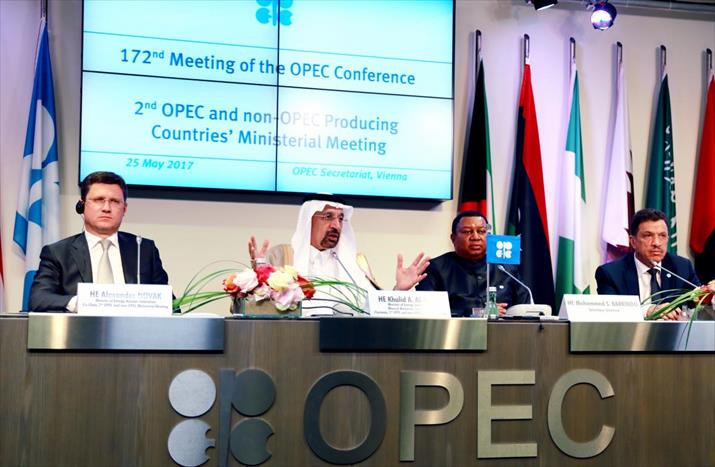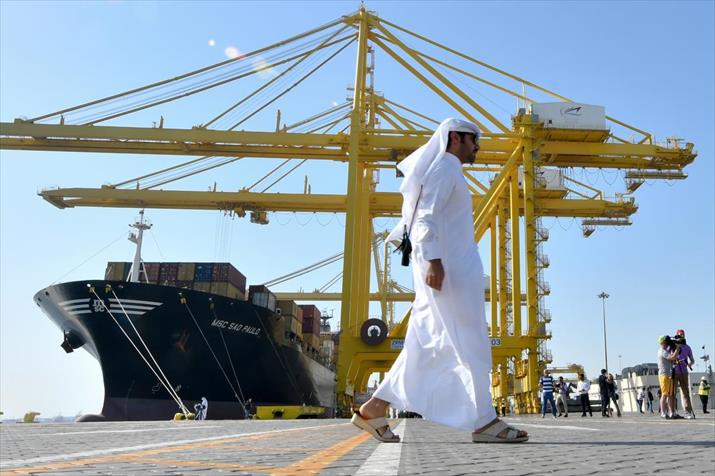| Opinion |
| Diplomatic Relations On Hold | |
| The Qatar crisis is unlikely to result in military confrontation | |
|
|
 OPEC and non-OPEC leaders agree to extend production cut by nine months at the OPEC headquarters in Vienna, Austria, on May 25 (XINHUA)
In early June, several Arab states including Saudi Arabia, Egypt and the United Arab Emirates (UAE), along with some countries in South Asia and Africa, one after another declared the severance of diplomatic relations with Qatar, mirroring the chronic discord between Qatar and Saudi Arabia and other Gulf Arab states. Multiple factors underlie the disharmony: the contradiction between Saudi Arabia's attempt to maintain its prominent position in the Gulf Cooperation Council (GCC) and Qatar's rising ambitions; complicated conflicts over religious issues and economic interests; the desire of Saudi Arabia's rulers to display a "daring and resolute" image; and U.S. President Donald Trump's administration's dislike of the outcomes of the so-called color revolutions. Furthermore, the UAE followed Saudi Arabia to distance itself from Qatar—the UAE's most competent GCC rival in economic terms. As for Saudi Arabia, a tense power struggle over succession provides a major motive for decision makers to go to such an extreme. Saudi Arabia's King Salman bin Abdulaziz al Saud vested almost all of the country's real power in his son, Mohammed bin Salman bin Abdulaziz al Saud. Now, having elevated this son to the position of crown prince—the direct heir to the Saudi throne—the king has overturned the established succession order and sidelined the former crown prince and interior minister, Mohammed bin Nayef bin Abdulaziz al Saud, who is the king's nephew. To improve their standing as the struggle played out, members of Saudi Arabia's ruling elite have good reason to display their power and determination, as has been the case with the military intervention waged against Ansar Allah (commonly known as the Houthis) in Yemen, the execution of dissident cleric Nimr al-Nimr despite widespread protest, and the recent break with Qatar. The U.S. factor Since the United States has the largest external impact on the Middle East, any change in its governance and foreign policy may influence the standing of certain nations in the region. If the current U.S. administration adopted a "values export" foreign policy approach and sought to foment color revolutions in the same vein as Barack Obama and Hillary Clinton, small but ambitious Qatar would be favored by Uncle Sam, and nations like Saudi Arabia would most likely refrain from acting so drastically, despite their strong discontent. Trump, however, apparently diverges markedly from his predecessor on this front, as he intends to reduce overseas military intervention and focus on domestic economic expansion. In his eyes, therefore, Qatar is not of major importance. In Trump's inaugural speech, he didn't lash out at China as he did during the campaign period. Instead, he said that the United States would seek friendship and goodwill with other nations of the world, on the understanding that it's every nation's right to prioritize its own interests. "We don't seek to impose our way of life on anyone, but rather to let it shine as an example for everyone to follow," said Trump. Such a statement indicates that the Trump administration might forego the strategy of instigating color revolutions. For this reason, Saudi Arabia's rulers might have tried to eliminate the ill feeling against the U.S. president engendered by his provocative campaign rhetoric. Concurrently, they have also become emboldened to the point of feeling at liberty to teach Qatar a lesson. Noticeably, the U.S. profits from such conflicts: It has secured two massive arms deals with both the Saudis and the Qataris: $110 billion with the former and $12 billion with the latter, in a single month.  A man passes by a cargo ship at the Hamad Port in Doha, capital of Qatar, on June 14 (XINHUA)
Peaceful mediation expected But although Saudi Arabia delivered an ultimatum to Qatar with 10 requirements—such as Qatar cutting ties with the Muslim Brotherhood and Hamas—the two kingdoms' conflict is unlikely to morph into military confrontation; rather, it will almost certainly be eventually resolved through mediation. Why? For one thing, the West would be reluctant to see the rulers of Qatar—which has ranked highest among Arab states for human development in several recent editions of the United Nations' Human Development Report—being supplanted by ones installed by religiously conservative Saudi Arabia. For another, Riyadh is wary of taking military action in this case for fear of inadvertently harming Qatar-based U.S. military personnel. Moreover, the Saudi rulers' prestige at home has been dented somewhat by repeated attacks on Saudi forces by Houthi rebels in Yemen and the currently disadvantageous circumstances of Saudi-backed armed groups in Syria and Iraq. Meanwhile, Qatar's population largely consists of foreign residents, so any outbreak of fighting would embroil those responsible in a diplomatic brouhaha. As for the land blockade of Qatar imposed by countries including Saudi Arabia, it can have only limited impact, given that Qatari air and sea transportation infrastructure has developed apace. Last December, Qatar—having committed itself to developing non-fossil fuel industries—completed the construction of the Middle East's largest deep water port, thereby obviating the need for its maritime shipments to transit Dubai. And, regional powers dare not contravene the International Air Services Transit Agreement, whose stipulations constitute two of the fundamental building blocks of the international commercial aviation route network. Consequently, the land blockade by itself cannot completely cut off Qatar from the outside world. Potential impact In fact, most affected by the friction would be the prospects for the move to extend Organization of the Petroleum Exporting Countries (OPEC) production cuts. The more OPEC is stable and successful, the more likely it is that crude oil becomes overpriced and member states break the terms of the deal in order to grab market share. Yet, no enforcement mechanism has been put in place to punish countries that violate the agreement. Though things went well in the first several months after the deal was reached to shore up oil prices, it's hard to say whether that will continue to be the case during the extension of the agreement, as certain factors will come into play. Non-signatory countries such as the United States and Canada have taken advantage of OPEC production cuts to expand their output and exports. And the collapse of diplomatic ties between Qatar and Saudi Arabia will hinder the forming of consensus among OPEC members on prolonging the production cut period. As far as China is concerned, the conflict will most probably not affect its foreign trade significantly, as the presence of a U.S. military base in Qatar vastly diminishes the likelihood of a military incursion. China has established strategic relationships with both Qatar and Saudi Arabia. It hopes that the two Gulf states can settle their differences through negotiation rather than confrontation. Copyedited by Chris Surtees Comments to liuyunyun@bjreview.com |
|
||||||||||||||||||||||||||||
|
